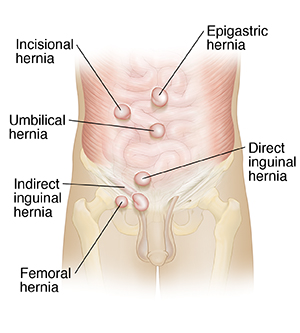What Is a Hernia?
A hernia is when an organ or tissue pushes through a weak spot in the belly (abdominal) wall. This weak spot may be there at birth. Or it may be caused by abdominal strain over time. If not treated, a hernia can get worse with time and physical stress.
When a bulge forms
When there is a weak spot in the abdominal wall, an organ or tissue can push outward. This often causes a bulge that you can see under your skin. The bulge may get bigger when you stand up. It may go away when you lie down. You may also feel some pressure or mild pain when lifting, coughing, urinating, or moving.
Types of hernias

The type of hernia you have depends on where it is. Most hernias form in the groin at or near the internal ring. This is the entrance to a canal between the abdomen and groin. Hernias can also occur in the abdomen, thigh, or genitals.
-
Incisional hernia. This occurs at the site of a previous surgical cut (incision).
-
Umbilical hernia. This occurs at the bellybutton (navel).
-
Indirect inguinal hernia. This occurs in the groin at the internal ring.
-
Direct inguinal hernia. This occurs in the groin near the internal ring.
-
Femoral hernia. This occurs just below the groin.
-
Epigastric hernia. This occurs in the upper abdomen at the midline.
Other types of hernias can occur. But they are rare.
Diagnosis
In most cases, your healthcare provider can diagnose a hernia with a physical exam.
In some cases, it might not be clear why you have swelling in the belly wall. You may need an imaging test such as an ultrasound or CT scan. This can help with the diagnosis.
Surgery
In children, an umbilical hernia can often heal on its own. In adults, a hernia will not heal on its own. Surgery is needed to repair the weak spot in the belly wall. If not treated, a hernia can get larger. It can cause serious health problems. Some hernias can be watched and repaired if they grow bigger or start to cause symptoms.
Most hernias are fixed with laparoscopic surgery. This type of surgery is done through several very small cuts. Some types of hernias may need surgery where a larger cut is made in the belly. In some cases, you can go home the same day as your surgery.
When to call your provider
Call or see your healthcare provider right away if the swelling around your hernia becomes larger, firmer, or more painful. These may be signs that your intestines are stuck in the belly wall and their blood supply is in trouble. This is an emergency. The hernia must be repaired right away to prevent severe problems.